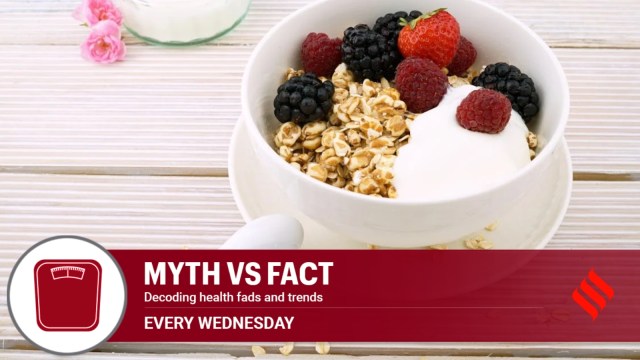Is Greek yogurt the best probiotic? Here’s what you should know
A marketing gimmick or magic pill, let’s bust an online myth
 Greek yogurt is made by straining regular yogurt. (File/ Representational Photo)
Greek yogurt is made by straining regular yogurt. (File/ Representational Photo)In the age of health-conscious eating, Greek yogurt has secured a place as a beloved dietary staple, often recommended by nutritionists. But is it better than regular yogurt?
Myth: Greek yogurt is different from regular yogurt
Fact: Each has their own strengths and one is not superior over the other. Greek yogurt is made by straining regular yogurt. The excess whey is removed and it becomes thicker and creamier which makes it more palatable. It requires more milk for consistency and is, therefore, expensive. Once the whey goes out, the lactose goes out, so it has a lower sugar and carbohydrate content. Since it uses more milk, it is high in protein. But then it also has lesser calcium and sodium than the regular variant.
Myth: Greek yogurt contains more probiotics than regular yogurt
Fact: The probiotic content in yogurt depends on the fermentation process and the bacterial strains used, not on whether it’s Greek or plain. High-quality yogurts, regardless of their flavour or colour, usually list their probiotic strains on the packaging. Look for terms like Lactobacillus acidophilus, Bifidobacterium bifidum, or Streptococcus thermophilus.
Some yogurts are sold as probiotic-rich but always verify the label for mentions of “live and active cultures.” Be cautious, as some flavoured yogurts undergo heat treatment after fermentation, which can kill beneficial bacteria.
Myth: Greek yogurt alone is enough for gut health
Fact: While yogurt is a convenient source of probiotics, it is not a magic bullet for gut health. A diverse gut microbiome thrives on variety, which means incorporating multiple sources of probiotics, such as kefir, kimchi, sauerkraut, miso, and kombucha, along with prebiotic-rich foods like garlic, onions, and bananas. Consuming a balanced diet with a mix of fermented foods and fibre-rich ingredients is the key to supporting a healthy digestive system.
Myth: Greek yogurt is always low in calories
Fact: While Greek yogurt can be lower in calories than other creamy snacks, flavoured varieties often contain added sugars, which increase calorie content. Some brands add sweeteners, artificial flavours or fruit preserves.
Myth: Greek yogurt is suitable for everyone
Fact: Those with lactose intolerance, milk allergies or sensitivities to dairy proteins may experience discomfort, bloating, or other adverse reactions. Greek yogurt has lower lactose levels than regular yogurt due to the straining process, but it’s not entirely lactose-free. Non-dairy options, such as almond or coconut milk-based yogurts, often lack the bacterial strains found in dairy-based yogurts unless explicitly fortified. Consumers with dietary restrictions should research brands carefully and choose products containing “live and active cultures.”
Myth: All Greek yogurt is the same
Fact: Authentic Greek yogurt is strained multiple times to remove whey, resulting in a thicker, creamier product. Many commercial “Greek-style” yogurts mimic this texture by adding thickeners like pectin or gelatin, which lead to insulin resistance.
(Dr Gupta is internal medicine specialist at Indraprastha Apollo Hospitals, New Delhi)



- 01
- 02
- 03
- 04
- 05




























